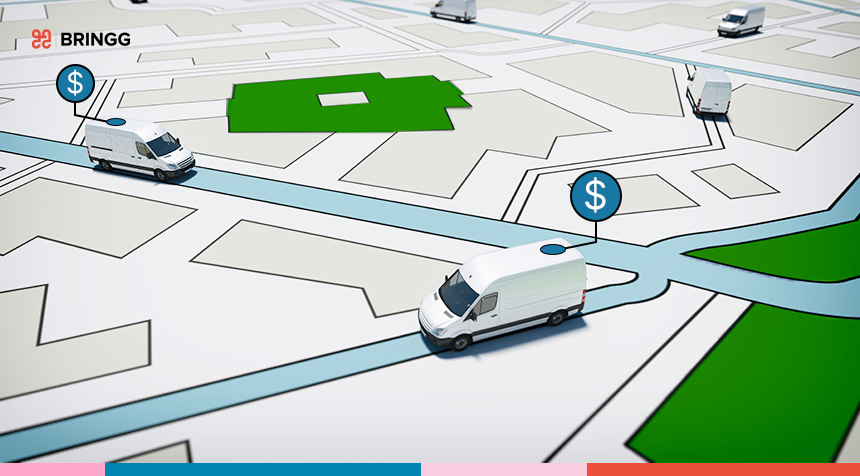In fleet management, time is money and every decision counts. Whether choosing the most efficient routes, scheduling maintenance to prevent costly breakdowns, or deciding between owning or leasing vehicles, each choice directly impacts your bottom line.
Keeping expenses in check while maintaining high service standards is a delicate balancing act requiring skill and strategic insight. Effective fleet management goes beyond cost-cutting; it involves fine-tuning delivery routes, leveraging technology, and implementing best practices that collectively improve performance and drive efficiency.
In this article, we explore these factors, offering practical, actionable strategies that can help transform your fleet to be more cost-effective and efficient.
What are the challenges in managing a fleet?
Understanding the challenges of fleet management is the first step to developing cost-effective strategies. Let’s take a closer look at what these challenges are.
- Rising fuel costs: Fuel is often the largest variable expense for delivery fleets. Fluctuating prices and inefficient route planning can lead to unexpectedly high costs.
- Unforeseen maintenance demands: Unexpected breakdowns can involve costly repairs and significant downtime, leading to productivity and revenue loss.
- Operational inefficiency: Delays from poorly planned routes or underutilization of assets can directly affect customer satisfaction and return business.
- Driver management and compliance: It’s vital to prioritize driver training and safety adherence. This not only minimizes turnover and ensures regulatory compliance but also avoids legal issues and fines.
- Technology integration: Keeping up with technological advancements and integrating them effectively into your fleet operations can be challenging, but it’s essential for efficiency and competitiveness.
- Environmental concerns: Increasing environmental regulations and the push towards sustainability require fleets to adopt eco-friendly practices, which may involve additional costs and operational changes.
- Customer satisfaction: In the end, customer satisfaction is paramount. Delays, inaccuracies, or inefficiencies in delivery can adversely affect your business reputation and customer loyalty.
Characteristics of effective fleet management
Effective fleet management optimizes resources, reduces costs, and maximizes efficiency while ensuring safety and compliance.
Here are the key characteristics of effective fleet management:
- Efficiency in operations: This includes optimal vehicle usage, efficient route planning, and minimizing downtime. Advanced tools help reduce mileage, save time, and enhance driver productivity, leading to cost savings and improved service quality.
- Cost reduction: Central to fleet management is looking for ways to reduce costs without sacrificing service quality. This is achieved through smart budgeting, cost-effective maintenance, and tech investments.
- Data-driven decision-making: Fleet managers use data from GPS tracking, fuel consumption, and driver behavior analytics to make informed decisions. This approach identifies areas for improvement and measures strategy effectiveness.
- Proactive maintenance: Effective fleet management includes preventive maintenance schedules tailored to vehicle usage and manufacturer guidelines. This minimizes costly repairs, extends vehicle life, and reduces downtime.
- Customer-centric ethos: The success of fleet management is reflected in customer satisfaction. Accurate tracking, timely deliveries, quick responses to queries, and high-quality service help to retain customers and boost brand reputation.
How to optimize your fleet management costs
Optimizing fleet management costs is essential for maintaining a competitive edge and ensuring business sustainability. Here’s how you can achieve this goal:
Adopt fleet management tools and technology
Investing in the right fleet management software can revolutionize how you manage your fleet, leading to substantial cost savings.
Fleet tracking and fleet driver management software
Fleet tracking and management software provides real-time visibility of the location and status of your vehicles. This enables better decision-making, improved asset utilization, and quicker response times.
Moreover, fleet driver management apps, such as Bringg, offer a range of features that help drivers perform their tasks more efficiently.
Common features include GPS navigation, route optimization, real-time delivery tracking, communication tools, proof of delivery, performance tracking, payment processing, and safety enhancements.
For more information, read our in-depth guide to fleet management software.
Route optimization software
Route optimization software can help you find the best routes for your drivers, considering factors such as traffic, weather, road conditions, customer preferences, and delivery windows. This can help you save time, fuel, and mileage, plus reduce emissions and wear and tear on your vehicles.
For example, Bringg ROAD is a delivery fleet management tool designed to manage internal fleets dynamically—no matter the size of your operations. It can automate and optimize every step of the last-mile journey, creating a seamless experience for drivers, dispatchers, and customers.
Telematics systems
Telematics systems monitor vehicle usage and driver behavior, finding areas where cost savings and efficiencies can be gained. Measure driving practices such as speeding, harsh braking, and idling to identify areas for correcting driver habits and improving fuel economy.
Maintenance scheduling and sensor-based monitoring tools
Regular vehicle maintenance helps to prevent costly breakdowns, downtime, and delays. Preventive maintenance ensures your fleet remains in top condition and extends vehicle life.
Employ scheduling tools to keep abreast of regular maintenance activities, including service history tracking and reminders for upcoming service needs.
Monitoring tools can track engine performance, tire pressure, and other vital metrics, sending alerts about potential issues before they become bigger problems.
Fuel management systems
Tools like Fuelman and WEX offer specialized fuel cards and management services that help track fuel purchases and consumption, identify unauthorized usage, and consolidate fuel expenses for better budgeting.
Role of the Fleet Manager
Another way to optimize fleet management costs is to employ a fleet manager who can coordinate operations more efficiently. Their role includes:
- Daily operations and planning: Assigning and dispatching vehicles and drivers, hiring and training, and monitoring and evaluating fleet performance and driver behavior.
- Budgeting: Implementing cost-saving measures and negotiating rates with vendors.
- Safety and compliance: Ensuring compliance with regulations and policies, enforcing safety and quality standards, resolving issues, and handling emergencies.
Optimize in-house fleet and third-party services
Adopting a hybrid strategy that combines the use of your fleet with third-party services can lead to significant cost savings, while also balancing control and flexibility.
Using your own fleet offers direct control over operations, enhancing brand identity and customer loyalty. However, it comes with higher capital investment, increased labor, and maintenance demands.
Conversely, outsourcing to third-party services reduces upfront costs, providing access to a broader network of carriers and delivery options. However, this solution may lead to reduced control over deliveries and potential impacts on brand consistency.
Bringg’s platform, for example, can be instrumental when taking a hybrid approach. It offers solutions that streamline coordination and integration, simplifying the management of both in-house and outsourced delivery services.
Driving toward optimized fleet management
Managing a fleet efficiently, particularly in terms of cost, is a multifaceted challenge that demands strategic planning and execution. Implementing a fleet management system or Delivery Management Platform (DMP) lets you track, analyze, and optimize all aspects of your fleet operations.
From reducing operational costs through efficient route planning and fuel management to ensuring timely maintenance and promoting driver safety, the benefits of fleet management contribute significantly to your business’s overall success.
Implementing the right fleet management software, like Bringg, is a strategic move that equips fleet managers with the tools for informed decision-making and operational optimization.



